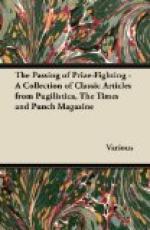* * * * *
I should be inclined to call Mr. NORMAN DOUGLAS our only example of the romantic satirist, though, unless you have some previous knowledge of his work, I almost despair of condensing the significance of this into a paragraph. For one thing the mere exuberance of his imagination is a rare refreshment in this restricted age. His latest book, with the stimulating title of They Went (CHAPMAN AND HALL), is an admirable example of this. Certainly no one else could have created this exotic city with its painted palaces and copper-encrusted towers, a vision of sea-mists and rainbows; or peopled it with so iridescent a company—the strange princess; the queen, her mother; the senile king who should have been (but wasn’t) her father; Theophilus, the Greek artist; the philosophic old Druidess, and the dwarfs who “chanted squeaky hymns amid sacrifices of mushrooms and gold-dust.” Perhaps this random quotation may hint at the fantastic nature of the tale; it can give no idea of the intelligence that directs it, mocking, iconoclastic, almost violently individual. Plot, I fancy, seldom troubles Mr. DOUGLAS greatly; it happens, or it does not. Meanwhile he is far more concerned in fitting a double meaning (at least) to the most simple-sounding phrase. To sum up, They Went is perhaps not for idle, certainly not for unintelligent, reading; for those who can appreciate quality in a strange guise it will provide a feast of unfamiliar flavours that may well create an appetite for more.
* * * * *
That clever writer, Mr. A. P. HERBERT, would lightly describe his story, The House by the River (METHUEN), as a “shocker.” But there are ways and ways of shocking. He might wish to show us the embarrassments of a fairly respectable member of the intellectual classes, living in a highly respectable environment, when he finds that he has committed homicide; and he might make the details as gruesome as he liked. But there was no need to shock the sensitive when he made his choice of the circumstances in which the poet, Stephen Byrne, inadvertently throttles his housemaid. It is a




